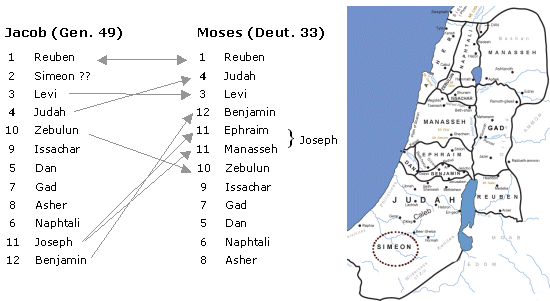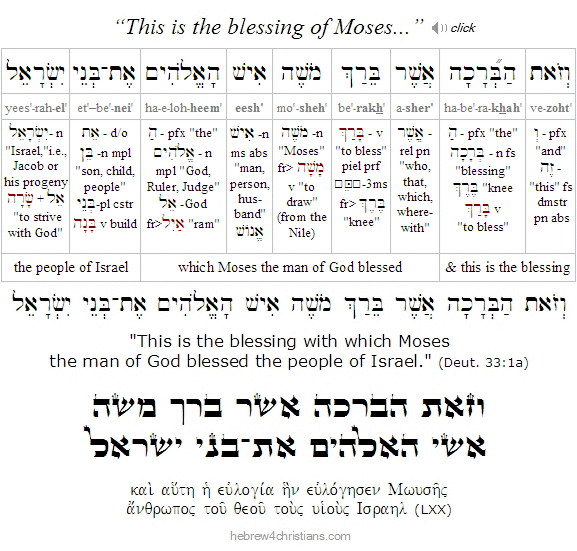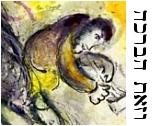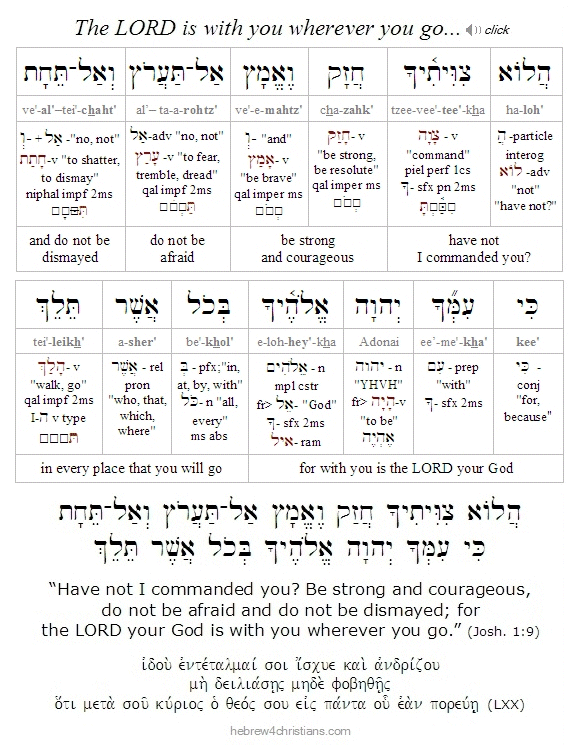|
|
 |
 |
 |
|
Weekly Torah Reading
|
|
|
|
Parashat V'zot HaBerakhah ("and this blessing")
|
|
|
 |
 |
|
Click on the links to display the Scriptures:
|
|
|
 |
 |
|
Torah Reading Overview
|
 |
 |
|
In last week's parashah (Ha'azinu), Moses taught the Israelites a prophetic shirah (song) that foretold Israel's history and sternly warned the people not to stray from the path that God had commanded them. Now, just before he was to die, Moses wanted to bless the tribes of Israel and to praise the LORD for His care of the fledgling nation.
The portion begins: "This is the blessing which Moses the man of God blessed Israel before his death."
|
|
|
 |
 |
|
This week's Torah portion (read during Simchat Torah) is called Vzot HaBerakhah ("this is the blessing"), which is also the last portion of the entire Torah. After reading this portion, we will "rewind the scroll" back to parashat Bereshit to begin reading the scroll all over again. We do this every year because Talmud Torah - the study of Torah - is a cyclical venture that equips us to better understand the Scriptures - including the New Testament.... In this connection, it is interesting to note that the first letter of the Torah is a Bet (בּ) in the word bereshit (בְּרֵאשִׁית), and the last letter of the Torah is a Lamed (ל) in Israel (יִשְׂרָאֵל). Putting these together, we get the word lev (לֵב), "heart," suggesting that the entire Torah - from the first letter to the last - reveals the heart and love of God for us. (Likewise, the first letter of Scripture is a Bet (בּ), as explained above, and the last letter is a Nun (ן) in the word "Amen" (אָמֵן), so the whole Bible - from beginning to end - reveals the Person of God the Son (בֶּן) for us.)
Vzot HaBerakhah contains Moses' last words to the people before his death on Mount Nebo in the land of Moab. According to midrash, when God came and told Moses to get ready to depart from this world, he appealed to God saying, "Wait until I bless Israel. All my life they have had no pleasant experiences with me, for I constantly rebuked them and admonished them to fear God and fulfill the commandments. I do not wish to leave this world before I have blessed them" (Ginzberg: Legends of the Jews).
The portion therefore begins, "And this is the blessing (וְזאת הַבְּרָכָה) with which Moses the man of God (אִישׁ הָאֱלהִים) blessed the people of Israel before his death" (Deut. 33:1). It is unclear if Moses' blessing was later appended to the Book of Deuteronomy by a scribe, or if Moses himself wrote about himself in the third person; nonetheless, the blessing begins with a poetic metaphor of God shining the Divine Light from Sinai: "The LORD came from Sinai and dawned (זָרַח) from Seir upon us; he shone forth from Mount Paran; he came from the ten thousands of holy ones, with a fire of knowledge (אֵשׁ דָּת) at his right hand" (Deut. 33:2). The blessing continues by stating that God's revelation was based on His love: "Yes, he cherished (חָבַב) his people, all his holy ones were in his hand; so they followed in your steps, receiving words from you, when Moses commanded us Torah as a heritage (מוֹרָשָׁה) for the congregation of Jacob" (Deut. 33:3-4). According to the sages, the word translated "heritage" in this verse (i.e., morashah) refers to a spiritual (rather than physical) inheritance that will abide forever. Maimonides further notes that the verse refers to the "congregation" (קְהִלָּה) of Jacob, not exculsively to the physical "seed" (i.e., natural descendants) of the Jewish people.... This implies that the Torah would become an inheritance for all those who would congregate with Jacob. All who are "grafted in" to Israel are therefore members of "God's congregation" (John 10:16; Rom. 11:16-24).
The revelation at Sinai was a coronation of God as the loving King of Israel: "Thus the LORD became king in Jeshurun (i.e., יְשֻׁרוּן, a poetic name for Israel based on the verb yashar, "straight," or upright"), when the heads of the people were gathered, all the tribes of Israel together" (Deut. 33:5). There is some discussion among the sages as to why Moses blessed the tribes in the order he did, and why the tribe of Simeon is missing (see comments below). Neither Jacob nor Moses blessed the sons of Israel according to their birth order, though both began with Reuben as the firstborn son of Jacob and Leah (compare Jacob's blessing of the tribes in Gen. 49:1-28).
|
 |
|
|
 |
 |
 |
|
Nachmanides comments that the order of the blessings was prophetic since they followed the tribe's future settlement. Thus, for example, Reuben is mentioned first because he was the first tribe to settle in Gilead, east of the Jordan (Josh. 13:15-23). Judah is mentioned next because he was the first to settle in the Promised Land itself (Josh 15; Judges 1:2). As to why Simeon is not mentioned, it is thought that this goes back to the incident at Shechem when Levi and Simeon brutally exacted revenge for the rape of their sister Dinah (Gen. 34), or perhaps to Simeon's leading role in the sin of Baal Peor (Num. 25:1-14). The tribe of Levi underwent teshuvah (as Moses mentioned in Deut. 33:9 because they refused to participate in the sin of the Golden Calf), though the tribe of Simeon had not. As it happened, the tribe of Simeon was later assimilated into the other tribes of Israel and did not have its own territory, whereas the tribe of Levi became itinerant Torah teachers of Israel (Deut. 33:10). Moses goes on to bless the remaining tribes, with a closing statement, "Happy are you, O Israel! Who is like you, a people saved by the LORD, the shield of your help, and the sword of your triumph! Your enemies shall come fawning to you, and you shall tread upon their backs" (Deut. 33:29).
After blessing the tribes, Moses went up from the plains of Moav to ascend Mount Nebo, where the LORD supernaturally revealed to him all the Promised Land. As Moses beheld the glory of the land, the LORD said to him, "This is the land of which I swore to Abraham, to Isaac, and to Jacob, 'I will give it to your offspring.' I have let you see it with your eyes, but you shall not go over there" (Deut. 34:4). The midrash relates that Moses then argued with God for his life and sought to overturn God's earlier decree by appealing to the Thirteen Attributes of Mercy implied in the Name YHVH (יהוה). God, however, refused Moses' request because of six serious sins that he had commited. First, Moses had initially refused to deliver the Jews (Exod. 4:13) and then later accused God of making conditions bad for Israel by not immediately delivering the people (Exod. 5:23). After the Exodus itself, Moses tested God twice during Korach's rebellion (Num. 16:29-30) and he further slandered the people on two separate occasions (Num. 20:10; 32:14). For these reasons Moses was forbidden to enter the Promised Land and died upon Mount Nebo in the land of Moab. "Moses was 120 years old when he died. His eye was undimmed, and his vigor unabated, and the people of Israel wept for Moses in the plains of Moab thirty days" (Deut. 34:7-8). God Himself buried Moses in an unknown place. According to Jewish tradition, Moses died on Adar 7.
Joshua the son of Nun was then established as Moses' successor among the people and the Torah concludes by affirming that "there has not arisen a prophet since in Israel like Moses, whom the LORD knew face to face (פָּנִים אֶל־פָּנִים) ... for all the mighty power and all the great deeds of terror that Moses did in the sight of all Israel" (Deut. 34:10-12).
The Date of the Death of Moses
As mentioned above, tradition states that Moses died on Adar 7. The sages reasoned that Israel mourned for 30 days after his death while camped in the plains of Moab (Deut. 34:8), and the Book of Joshua begins with God's command to bring the Jewish people across the Jordan, immediately following the 30 days of mourning (Josh 1:1-5). The sages assumed it took three days for Israel to cross the Jordan river, begining on the 10th of Nisan (Josh. 4:19). Subtracting 33 days from this time brings us back to the date of Adar 7.
Yasher Koach!
During the concluding verse of each book of the Torah it is customary for the congregation to stand as the final words are recited. Then, in a dramatic manner, the Torah reader signals to the congregation who then begin chanting: Chazak, chazak, ve-nit chazek (חָזַק חָזַק וְנִתְחַזֵּק) - "Be strong, be strong, and let us be strengthened!" This is a cry of encouragement to continue with the reading of the next book, and to return to this one again in due course. Torah study is an "unending circle" in which we hopefully discern more and more of God's revealed truth... May God help each one of us...
The Hebrew exclamation, "Yasher Koach!" (יָשֶׁר כּחַ) means "May your strength be firm," and is often said to congratulate people who have succeeded in their Torah studies. For those of you who have studied Torah over this last Jewish year, let me extend to you a heartfelt "Yashar Koach!" And since we are finishing the entire Torah cycle for this year, it is customary to enjoy a festive party (i.e., a siyyum: סִיּוּם) celebrating the completion of the study of a Jewish text. Studying the Torah is a great joy, chaverim, since it reveals the truth to us and helps us understand the LORD of Glory. As King David said, "You make known to me the path of life (ארַח חַיִּים); in your presence there is fullness of joy (שִׂמְחָה); at your right hand (i.e., with a fire of knowledge (אֵשׁ דָּת) at His right hand) there are pleasures forevermore" (Psalm 16:11).
Deut. 33:1 Hebrew reading lesson (click):
 |
|
 |
 |
|
 |
 |
 |
|
 |
|
|
|
Haftarah Reading Overview
|
|
|
|
The Haftarah for V'zot HaBerakhah records the start of Joshua's leadership as Moses' direct successor. Here the LORD directly commissioned him and instructed him to "be strong and of good courage" (chazak ve'ematz) no less than three times. The LORD ended his commission with these words:
This Book of the Law (sefer haTorah hazeh) shall not depart from your mouth, but you shall meditate on it day and night, so that you may be careful to do according to all that is written in it. For then you will make your way prosperous, and then you will have good success. Have I not commanded you? Be strong and courageous (chazak ve'ematz). Do not be frightened, and do not be dismayed, for the LORD your God is with you wherever you go. (Joshua 1:8-9)
|
|
|
|
הֲלוֹא צִוִּיתִיךָ חֲזַק וֶאֱמָץ
אַל־תַּעֲרֹץ וְאַל־תֵּחָת
כִּי עִמְּךָ יְהוָה אֱלֹהֶיךָ בְּכֹל אֲשֶׁר תֵּלֵךְ
ha-lo tzee-vee-tee-kha? cha·zak ve-e·matz
al-ta'a·rohtz ve-al-te·chat
kee ee·me·kha Adonai e·lo·hey'·kha be·khol a·sher tei·leikh

Have not I commanded you? Be strong and courageous;
do not be afraid and do not be dismayed,
for the LORD your God is with you wherever you go. (Josh. 1:9)
Download Reading Card

Joshua 1:9 Hebrew reading lesson:
After his commissioning, Joshua commanded the leaders to make themselves ready to conquer the Promised Land as instructed by the LORD.
|
|
|
 |
|
|
|
Brit Chadashah Overview
|
|
 |
 |
|
The reading from the last chapter of the Brit Chadashah provides a vision of "heavenly Jerusalem" and the River of the Water of Life that flows through the city from the very throne of God and of the Lamb. "Paradise lost" is restored by the love and grace of the LORD God of Israel.
Blessing:
|
|
|
 |
 |
|
Related Discussion:
|
|
|
|
 |
 |
|
Hebrew Audio Files:
|
|
 |
 |
|
Click the following links to hear the desired chapters read from this week's Torah:
|
|







